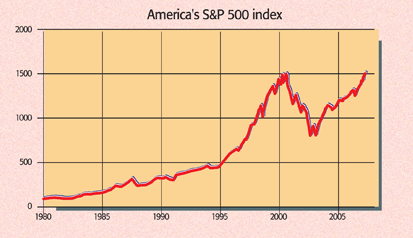Get the latest financial news, insights and expert analysis from our award-winning MoneyWeek team, to help you understand what really matters when it comes to your finances.
You are now subscribed
Your newsletter sign-up was successful
Want to add more newsletters?

Twice daily
MoneyWeek
Get the latest financial news, insights and expert analysis from our award-winning MoneyWeek team, to help you understand what really matters when it comes to your finances.

Four times a week
Look After My Bills
Sign up to our free money-saving newsletter, filled with the latest news and expert advice to help you find the best tips and deals for managing your bills. Start saving today!
Most major markets have been closing in on their 2000 peaks. Last week, though, the world's most widely watched stock index America's S&P 500 finally closed above its 2000 record of 1,527. But foreign investors won't be celebrating just yet; in euro terms, the index is down by about 30%. What's more, adjusting for inflation, local investors are still out of pocket by 20%, says investment adviser Rathbones.
Still, it's good news for the bulls, who have also been encouraged by the fact that long-time bear Richard Russell, editor of Dow Theory Letters, has changed his tune. Russell, who "has a stellar long-term market timing record", as Mark Hulbert points out on Marketwatch.com, turned bearish on the secular trend in late 1999 and stuck to this view until last month. He had dismissed the upswing of the past four years as a bear rally within a primary downtrend. But he has now decided that the Dow's post-2000 slide was merely a correction in the bull market that started in 1982 and that its final, most speculative phase in which small investors, hitherto wary, rush into stocks lies ahead.

So are we at the beginning of the end of a long bull market, rather than at the end of the beginning of a long bear market? Either way, the outlook for US stocks hardly seems compelling. The economy and profit growth are both slowing and the S&P's p/e of 18, while much lower than the 2000 figure of 30, remains above the historic average, implying low long-term returns from here. And the credit boom fuelling the takeover market rests on rocky foundations. Thanks to increasingly lax lending standards in private-equity deals, "it is only a question of when" things go wrong, as fund manager Anthony Bolton notes. And the FT's Gillian Tett highlights the risk in credit derivatives, the growth of which has fuelled the appetite for debt. Their ability to disperse risk has yet to be tested by a major world downturn or large economic shock.
MoneyWeek
Subscribe to MoneyWeek today and get your first six magazine issues absolutely FREE

Sign up to Money Morning
Don't miss the latest investment and personal finances news, market analysis, plus money-saving tips with our free twice-daily newsletter
Don't miss the latest investment and personal finances news, market analysis, plus money-saving tips with our free twice-daily newsletter
Just about every asset class has been sent sky-rocketing by the liquidity boom of the past few years, says legendary investor Jeremy Grantham. So what might end the global bubble? A surge in inflation, which would necessitate higher interest rates, is one possible catalyst, he reckons. But and here his view chimes with Russell's we're not there yet: the global bubble has yet to reach a final, manic phase.
Get the latest financial news, insights and expert analysis from our award-winning MoneyWeek team, to help you understand what really matters when it comes to your finances.
MoneyWeek is written by a team of experienced and award-winning journalists, plus expert columnists. As well as daily digital news and features, MoneyWeek also publishes a weekly magazine, covering investing and personal finance. From share tips, pensions, gold to practical investment tips - we provide a round-up to help you make money and keep it.
-
 Should you buy an active ETF?
Should you buy an active ETF?ETFs are often mischaracterised as passive products, but they can be a convenient way to add active management to your portfolio
-
 Power up your pension before 5 April – easy ways to save before the tax year end
Power up your pension before 5 April – easy ways to save before the tax year endWith the end of the tax year looming, pension savers currently have a window to review and maximise what’s going into their retirement funds – we look at how

